Michael Swanwick's Blog, page 138
January 19, 2015
Alice K. Turner, Last of Her Kind
.
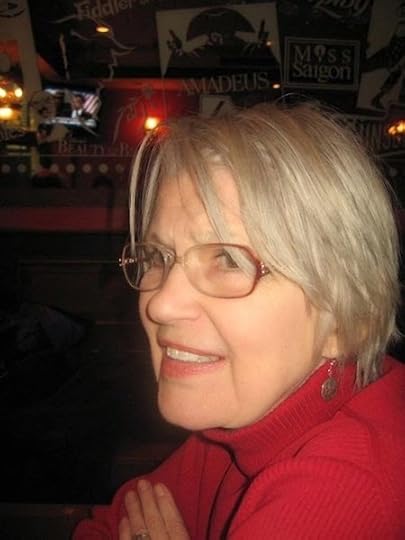
This is extremely sad. Alice K. Turner died last night, of pneumonia. Alice is best known for her twenty years as fiction editor of Playboy for two decades (1980-2000), during which time she was remarkably receptive to science fiction, provided only that it was as good as or better than anything else she might have bought that month. During her tenure, the fiction -- whether genre or not -- was always worth buying the magazine for.
Alice's attitude toward science fiction showed in the fact that she kept up her association with it after retirement, attending the occasional convention, writing critical essays and, with Michael Andre-Driussi, editing the critical volume Snake's-Hands: The Fiction of John Crowley . She also wrote The History of Hell, a work of non-fiction.
Alice was a delight to hang out with and talk with. What she liked, she liked for the best of reasons, all of which she could articulate. If what you had to say was worth hearing, she would listen to you forever. But only the most boorish of creatures would attempt to dominate a conversation with her, because her wit and insight were of the finest water.
Alice's good friend, Ellen Datlow, another editor of renown, notes that a friend called her "one of the last grande dames of New York." Not a bad encomium for a smart, elegant, and wholly admirable woman to receive.
Above: Ellen Datlow's photo of Alice Turner.
*

This is extremely sad. Alice K. Turner died last night, of pneumonia. Alice is best known for her twenty years as fiction editor of Playboy for two decades (1980-2000), during which time she was remarkably receptive to science fiction, provided only that it was as good as or better than anything else she might have bought that month. During her tenure, the fiction -- whether genre or not -- was always worth buying the magazine for.
Alice's attitude toward science fiction showed in the fact that she kept up her association with it after retirement, attending the occasional convention, writing critical essays and, with Michael Andre-Driussi, editing the critical volume Snake's-Hands: The Fiction of John Crowley . She also wrote The History of Hell, a work of non-fiction.
Alice was a delight to hang out with and talk with. What she liked, she liked for the best of reasons, all of which she could articulate. If what you had to say was worth hearing, she would listen to you forever. But only the most boorish of creatures would attempt to dominate a conversation with her, because her wit and insight were of the finest water.
Alice's good friend, Ellen Datlow, another editor of renown, notes that a friend called her "one of the last grande dames of New York." Not a bad encomium for a smart, elegant, and wholly admirable woman to receive.
Above: Ellen Datlow's photo of Alice Turner.
*
Published on January 19, 2015 07:34
January 16, 2015
Problems of Literary Success
.
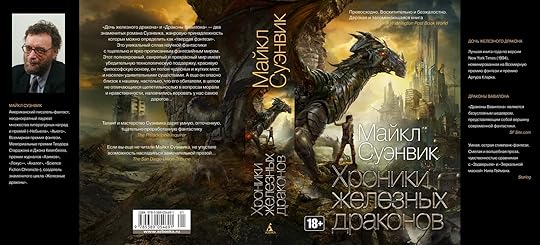
Back in the early 1980s, when I was a new writer and my generational peers (Pat Cadigan, Bill Gibson, Bruce Sterling, etc., etc.) were blasting holes in science fiction as it was then and building up strange new structures to the empty spaces, I got an invitation from a science fiction club in Dublin to speak there. They couldn't afford to fly me in from America, they said, but if I was ever in Europe they could cover my travel expenses.
As luck would have it, not long after, Marianne and I decided to go to Ireland, rent a car, and see as much as two human beings possibly could in two weeks. So I wrote back to say I'd be in Dublin on such and so specific dates and would be happy to talk to and with the club at no expense to them.
No reply.
In the months leading up to the trip, I wrote a few more letters, with the same lack of response. The last one gave the telephone number of our landlady on Clontarf Road and said they could leave a message for me with her.
No reply.
Standing on the quad of Trinity University, Marianne asked, a little mournfully, "Why can't you get the cool speaking invitations that others writers do?" I could only shrug.
Two weeks later, we were home again. Two days after that, I received another message from the same science fiction club. Their secretary had quit, taking with him or her all their correspondence, it said. But if I was ever in Europe, they'd love to have me come for a talk.
I was put in mind of this story because recently I received an invitation to a part of the world I love and had to turn it down . . . because I'll be in China at the scheduled time.
I'm sure your heart bleeds for me.
Above: My thanks to Shamil Idiatullin for alerting me to the cover of the Russian edition of The Iron Dragon's Daughter and The Dragons of Babel. It looks great, doesn't it? The artist is Sergey Shikin.
*

Back in the early 1980s, when I was a new writer and my generational peers (Pat Cadigan, Bill Gibson, Bruce Sterling, etc., etc.) were blasting holes in science fiction as it was then and building up strange new structures to the empty spaces, I got an invitation from a science fiction club in Dublin to speak there. They couldn't afford to fly me in from America, they said, but if I was ever in Europe they could cover my travel expenses.
As luck would have it, not long after, Marianne and I decided to go to Ireland, rent a car, and see as much as two human beings possibly could in two weeks. So I wrote back to say I'd be in Dublin on such and so specific dates and would be happy to talk to and with the club at no expense to them.
No reply.
In the months leading up to the trip, I wrote a few more letters, with the same lack of response. The last one gave the telephone number of our landlady on Clontarf Road and said they could leave a message for me with her.
No reply.
Standing on the quad of Trinity University, Marianne asked, a little mournfully, "Why can't you get the cool speaking invitations that others writers do?" I could only shrug.
Two weeks later, we were home again. Two days after that, I received another message from the same science fiction club. Their secretary had quit, taking with him or her all their correspondence, it said. But if I was ever in Europe, they'd love to have me come for a talk.
I was put in mind of this story because recently I received an invitation to a part of the world I love and had to turn it down . . . because I'll be in China at the scheduled time.
I'm sure your heart bleeds for me.
Above: My thanks to Shamil Idiatullin for alerting me to the cover of the Russian edition of The Iron Dragon's Daughter and The Dragons of Babel. It looks great, doesn't it? The artist is Sergey Shikin.
*
Published on January 16, 2015 07:00
January 14, 2015
This Wonderful Buttery World
.

I just drove home from Harrisburg and, boy, are my tires armed! Thank you, ladies and germs. I'll be here all week.
Seriously, it was great fun attending the Pennsylvania Farm Show. It's the one time of year when farmers get to strut their stuff and the rest of us get to admire them. [The Web being what it is, I should mention that I mean that quite seriously.]
This year I was particularly struck by the weight of time and technology behind every aspect of the food we eat. It takes a lot of concentrated effort and selective breeding to create a Black Breasted Red Old English Game Bantam Chicken. And the carriages that horses pull nowadays? George Washington could only dream of their like.
But let's be honest here, it's the butter sculpture everybody wants to see. So there it is up top, a little murkily photographed but well worth seeing. Because it includes a butter cow. You don't get much butter sculpturey-er than that.
*

I just drove home from Harrisburg and, boy, are my tires armed! Thank you, ladies and germs. I'll be here all week.
Seriously, it was great fun attending the Pennsylvania Farm Show. It's the one time of year when farmers get to strut their stuff and the rest of us get to admire them. [The Web being what it is, I should mention that I mean that quite seriously.]
This year I was particularly struck by the weight of time and technology behind every aspect of the food we eat. It takes a lot of concentrated effort and selective breeding to create a Black Breasted Red Old English Game Bantam Chicken. And the carriages that horses pull nowadays? George Washington could only dream of their like.
But let's be honest here, it's the butter sculpture everybody wants to see. So there it is up top, a little murkily photographed but well worth seeing. Because it includes a butter cow. You don't get much butter sculpturey-er than that.
*
Published on January 14, 2015 14:46
January 12, 2015
Your Moment of Nabokov
.
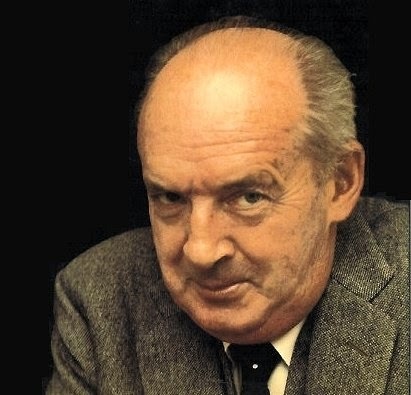
A literary figure hounded by an increasingly hostile biographer is a premise ready-made for Vladimir Nabokov's fiction. So it's ironic that, late in life and at the height of his success, his relationship with Andrew Field, author of four books (and a bibliography) about Nabokov, went from friendship to sourness to reciprocal spite.
In Brian Boyd's Vladimir Nabokov: The American Years (p. 618), Boyd record of Field that, among his many other alleged sins:
Which is a detail so perfectly apt that one wonders it doesn't appear in one of the novels.
*

A literary figure hounded by an increasingly hostile biographer is a premise ready-made for Vladimir Nabokov's fiction. So it's ironic that, late in life and at the height of his success, his relationship with Andrew Field, author of four books (and a bibliography) about Nabokov, went from friendship to sourness to reciprocal spite.
In Brian Boyd's Vladimir Nabokov: The American Years (p. 618), Boyd record of Field that, among his many other alleged sins:
Informed that an event he had assigned to 'a wet autumnal day' had in fact taken place 'in July,' he had simply retyped the phrase as 'a wet autumnal day in July.'
Which is a detail so perfectly apt that one wonders it doesn't appear in one of the novels.
*
Published on January 12, 2015 07:44
January 9, 2015
I DO NOT HATE AND I AM NOT AFRAID
.Je suis Stephane.
Je suis Jean.
Je suis Georges.
Je suis Bernard.
Je suis Philippe.
Je suis Bernard.
Je suis Elsa.
Je suis Mustapha.
Je suis Michel.
Je suis Frederic.
Je suis Franck.
Je suis Ahmed.
Je suis Charlie.
*
Je suis Jean.
Je suis Georges.
Je suis Bernard.
Je suis Philippe.
Je suis Bernard.
Je suis Elsa.
Je suis Mustapha.
Je suis Michel.
Je suis Frederic.
Je suis Franck.
Je suis Ahmed.
Je suis Charlie.
*
Published on January 09, 2015 06:09
January 7, 2015
Best SF Short Story Award
.

If it weren't for the fact that the gods loathe hubris and are quick to wrath, I'd casually declare that I've won my first award of the year. As if it were no big deal and I were expecting several dozen more over the next twelve months.
So I'll just state happily that Best SF, a website I visit regularly for their short fiction reviews, has chosen "Passage of Earth" as best short story of the year.
You can read about it here. And read the original review of the story here. Or (and this is probably the best way to do it) you can just go to the main site, wandering about and looking for suggestions of stories you might want to look up, the way I do, here.
And as always . . .
I'm on the road again. That's what happens when you have the freedom to travel and can afford to do so. Trips happen.
*

If it weren't for the fact that the gods loathe hubris and are quick to wrath, I'd casually declare that I've won my first award of the year. As if it were no big deal and I were expecting several dozen more over the next twelve months.
So I'll just state happily that Best SF, a website I visit regularly for their short fiction reviews, has chosen "Passage of Earth" as best short story of the year.
You can read about it here. And read the original review of the story here. Or (and this is probably the best way to do it) you can just go to the main site, wandering about and looking for suggestions of stories you might want to look up, the way I do, here.
And as always . . .
I'm on the road again. That's what happens when you have the freedom to travel and can afford to do so. Trips happen.
*
Published on January 07, 2015 00:30
January 5, 2015
The Godless Atheist Christmas Card of the Year!
.

It's January, so once again the Not At All Nepotistic Blue Ribbon Panel of Family has convened to deliberate on which of the many honorable attempts will be 2014's Godless Atheist Christmas Card of the Year.
As always, it was a contentious process. I, for one, felt that cards actively promoting demonology or even Satanism ought to be allowed in the competition. Marianne adamantly believed that in opposition they asserted at least the existence of a Deity. Finally, she won the day by pointing out that the immortal Jason Van Hollander's Hell Stamps mailing was not actually a holiday card but a gift tag accompanying a work of art. Similarly, John and Judith Clute's card, always a contender, was ruled spiritual by the inclusion of what we believe to be Raven's image. The fact that the card also featured people screaming in terror was ruled irrelevant.
Other cards escaped the honor by the flimsiest of rationales. One art card featuring the sender's oil of woods in autumn was deemed to imply the season of winter by evoking a scene within three months of it. The Edgar Allen Poe card was ruled Christmasy by the fact that Poe was wearing a scarf and his raven a nightcap similar to Santa's. The Cthulhu Claus card was the victim of similar solipsism. My sister's card featuring a trophy mount of Rudolph's head was judged to be too similar to a winning card she sent in a prior year.
Finally, the judging came down to two cards -- neither of which anybody wanted to disqualify. But my suggestion that we declare a tie was hooted down by the panel. "No wonder nobody respects liberals!" Sean declared in exasperation. Our friend Li's card, showing an alien hellscape dominated by a science fictional city built entirely of kitchen utensils was not only the first card we received by a front-runner throughout.
But at last, in a split decision ( this almost never happens!), a winner was chosen: Photographer Beth Gwinn's breathtaking Poinsettia Patty card.
(Beth Gwinn took two author photographs of me -- which I use for the insides of dust jackets and the like -- so good that I've resolved to stop aging, simply so that I never have to replace them with inferior portraits. She's really a brilliant photographer. You can visit her website here.)
Beth's photograph won despite utilizing poinsettias (a plant associated with Christmas) because of the model's air of haughty disregard and the high degree of design and beauty put into the service of a most un-Christmasy sentiment, and because the message inside ("...HAVE YOUR POINSETTIAS SPAYED OR NEUTERED THIS HOLIDAY SEASON") managed to seamlessly insert the theme of castration into a holiday card.
Well done, Ms Gwinn! Your vintage Marvel no-prize is winging its way through to aether to you at this very moment.
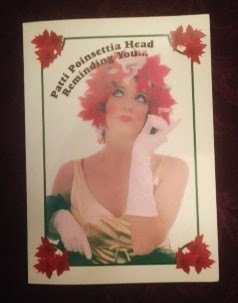
Above: Seriously, those in need an author photo should check out Beth Gwinn's work. I'm delighted with how good she made me look.
*

It's January, so once again the Not At All Nepotistic Blue Ribbon Panel of Family has convened to deliberate on which of the many honorable attempts will be 2014's Godless Atheist Christmas Card of the Year.
As always, it was a contentious process. I, for one, felt that cards actively promoting demonology or even Satanism ought to be allowed in the competition. Marianne adamantly believed that in opposition they asserted at least the existence of a Deity. Finally, she won the day by pointing out that the immortal Jason Van Hollander's Hell Stamps mailing was not actually a holiday card but a gift tag accompanying a work of art. Similarly, John and Judith Clute's card, always a contender, was ruled spiritual by the inclusion of what we believe to be Raven's image. The fact that the card also featured people screaming in terror was ruled irrelevant.
Other cards escaped the honor by the flimsiest of rationales. One art card featuring the sender's oil of woods in autumn was deemed to imply the season of winter by evoking a scene within three months of it. The Edgar Allen Poe card was ruled Christmasy by the fact that Poe was wearing a scarf and his raven a nightcap similar to Santa's. The Cthulhu Claus card was the victim of similar solipsism. My sister's card featuring a trophy mount of Rudolph's head was judged to be too similar to a winning card she sent in a prior year.
Finally, the judging came down to two cards -- neither of which anybody wanted to disqualify. But my suggestion that we declare a tie was hooted down by the panel. "No wonder nobody respects liberals!" Sean declared in exasperation. Our friend Li's card, showing an alien hellscape dominated by a science fictional city built entirely of kitchen utensils was not only the first card we received by a front-runner throughout.
But at last, in a split decision ( this almost never happens!), a winner was chosen: Photographer Beth Gwinn's breathtaking Poinsettia Patty card.
(Beth Gwinn took two author photographs of me -- which I use for the insides of dust jackets and the like -- so good that I've resolved to stop aging, simply so that I never have to replace them with inferior portraits. She's really a brilliant photographer. You can visit her website here.)
Beth's photograph won despite utilizing poinsettias (a plant associated with Christmas) because of the model's air of haughty disregard and the high degree of design and beauty put into the service of a most un-Christmasy sentiment, and because the message inside ("...HAVE YOUR POINSETTIAS SPAYED OR NEUTERED THIS HOLIDAY SEASON") managed to seamlessly insert the theme of castration into a holiday card.
Well done, Ms Gwinn! Your vintage Marvel no-prize is winging its way through to aether to you at this very moment.

Above: Seriously, those in need an author photo should check out Beth Gwinn's work. I'm delighted with how good she made me look.
*
Published on January 05, 2015 08:04
January 2, 2015
Your New Year's Resolutions
.

This post is for all the gonnabe writers out there. This year you will:
1. Write prodigiously.
There is no way around this one.
2. Finish what you write.
There's an old saying that stories are not finished but abandoned. There comes a point at which all the rewriting and revising in the world is not going to make the story any better. To the contrary, it's going to make the story worse. You have to learn to stop when you reach that point.
3. Submit your fiction to paying markets.
It's entirely possible that the best writer in the world is named Hieronymus Lafcadio Smith. But since nobody by that name has ever been published, we'll never know.
4. Continue to submit your fiction until somebody buys it.
I've known a lot of talented writers who couldn't take rejection. You've never heard of any of them.
6. Refrain from giving me a hard time for ripping off Robert Heinlein for this advice.
That's what dead writers are for. Feel free to steal everything you can -- save actual combinations of words -- from them.
Above: If proof were ever needed that I'm not much of a photographer, there it is. The Philadelphia Mummers are the most photogenic people on earth. Their parades are filled with images straight out of dreams -- or even hallucinations. If you ever get a chance to see them in person (television is nowhere near as good), by all means do.
*

This post is for all the gonnabe writers out there. This year you will:
1. Write prodigiously.
There is no way around this one.
2. Finish what you write.
There's an old saying that stories are not finished but abandoned. There comes a point at which all the rewriting and revising in the world is not going to make the story any better. To the contrary, it's going to make the story worse. You have to learn to stop when you reach that point.
3. Submit your fiction to paying markets.
It's entirely possible that the best writer in the world is named Hieronymus Lafcadio Smith. But since nobody by that name has ever been published, we'll never know.
4. Continue to submit your fiction until somebody buys it.
I've known a lot of talented writers who couldn't take rejection. You've never heard of any of them.
6. Refrain from giving me a hard time for ripping off Robert Heinlein for this advice.
That's what dead writers are for. Feel free to steal everything you can -- save actual combinations of words -- from them.
Above: If proof were ever needed that I'm not much of a photographer, there it is. The Philadelphia Mummers are the most photogenic people on earth. Their parades are filled with images straight out of dreams -- or even hallucinations. If you ever get a chance to see them in person (television is nowhere near as good), by all means do.
*
Published on January 02, 2015 08:38
December 31, 2014
A Midwinter Night's Cigar
.

Back when I smoked three packs a day, I thought that if only I could smoke one cigarette a day I'd get all the pleasure there was out of smoking. When I finally managed to quit (using the go-to-Ireland-and-don't-bring-cigarettes method), I discovered that four cigars a year sufficed.
Not that I always smoke that many. This year I had only two: one in March and one the other night.
Cigars being so rare in my life, each one is a special occasion. I buy a very good one and when the time comes, go out into the back yard with a glass of scotch. Then I sit alone, in the night, thinking about whatever I'm currently working on. The Next Novel, in this case. I slowly smoke the cigar, aided by an occasional sip of whisky. I plot as far in advance as I can. And I make notes.
That's my notebook up above with my pen clipped to the right-hand page. I took a moment off from thinking and taking notes to photograph it lying in my lap, very much like a cat. The lights are fortuitous, an artifact of the laser Christmas light system that Sean and I installed this year.
So my year has ended peacefully. Many good things happened this year and I am grateful for them all. I wish the same for you in the coming year. Be happy, be well, be kind to one another.
*

Back when I smoked three packs a day, I thought that if only I could smoke one cigarette a day I'd get all the pleasure there was out of smoking. When I finally managed to quit (using the go-to-Ireland-and-don't-bring-cigarettes method), I discovered that four cigars a year sufficed.
Not that I always smoke that many. This year I had only two: one in March and one the other night.
Cigars being so rare in my life, each one is a special occasion. I buy a very good one and when the time comes, go out into the back yard with a glass of scotch. Then I sit alone, in the night, thinking about whatever I'm currently working on. The Next Novel, in this case. I slowly smoke the cigar, aided by an occasional sip of whisky. I plot as far in advance as I can. And I make notes.
That's my notebook up above with my pen clipped to the right-hand page. I took a moment off from thinking and taking notes to photograph it lying in my lap, very much like a cat. The lights are fortuitous, an artifact of the laser Christmas light system that Sean and I installed this year.
So my year has ended peacefully. Many good things happened this year and I am grateful for them all. I wish the same for you in the coming year. Be happy, be well, be kind to one another.
*
Published on December 31, 2014 07:07
December 29, 2014
A Candle From Space
.
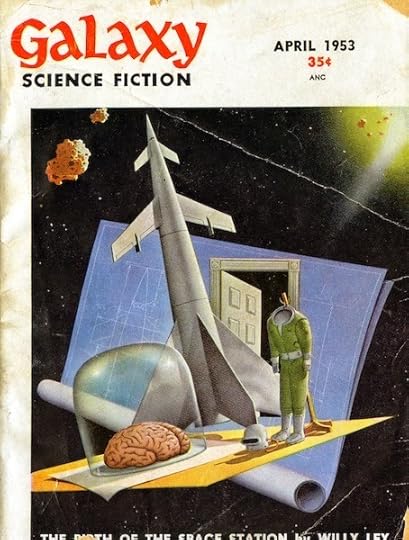
My sister Barbie sent me the above issue of Galaxy because she ran across it in a house sale and thought I might like it. She was right, of course. It contained a Kurt Vonnegut story and one by Murray Leinster and Robert Sheckley's "The Seventh Victim," which was made into the movie The 10th Victim , in which Ursula Andress killed a man with her brassiere gun.
But the coolest aspect of the magazine was Willy Ley's essay. Ley was one of the founders of the Verein für Raumschiffahrt (Society for Space Travel) before fleeing the Nazis and settling down in America, where he was an extremely influential popularizer of rocketry and space travel.
"The Birth of the Space Station" is chiefly about Hermann Oberth's speculations about space stations in his pioneering book Die Rakete zu den Planetenräumen (Rocket to Interplanetary Space). There is much to delight in here, but I won't retell Ley's essay. Instead, I want only to share one quote from Oberth:
Isn't that lovely? Satellite communications by candle! The book was written in 1921, remember, when radio was still in its infancy. But what a wonderful combination of prescience and failure to extrapolate, of space stations and candlelight.
There is intellectual satisfaction in predictions that come true. But sometimes there is emotional satisfaction in those that don't.
And speaking of Great Satan Amazon . . .
A short while ago, Amazon got into a dispute with the Hachette Book Group over whether the publisher should get to decide how much their books sell for or the retailer. At the time, a significant number of self-published writers sided with Amazon because they believed that it was on their side.
It was not. Even more recently, Amazon began what the New York Times characterizes as an "all-you-can-eat" program, offering subscribers unlimited e-book reads for ten dollars a month. A lot of indy writers who were doing pretty well there suddenly found their sales plummeting. Some, who had quit their day jobs, found that what had been a career was now a hobby.
It would be easy to see this as a case of poetic justice. But to sneer at the self-published writers who have been screwed over by a big corporation would be a mistake -- the same mistake that they themselves (out of innocence and ignorance) earlier made. Writers should support other writers. We are weak enough, God knows, compared to Amazon or Google or anybody else who thinks it would be a great idea if the business guys got all the profit and the artist guys had no choice but to provide their work for free.
We must all hang together, right? You know how the rest of that goes.
You can read the NYTimes article here.
*

My sister Barbie sent me the above issue of Galaxy because she ran across it in a house sale and thought I might like it. She was right, of course. It contained a Kurt Vonnegut story and one by Murray Leinster and Robert Sheckley's "The Seventh Victim," which was made into the movie The 10th Victim , in which Ursula Andress killed a man with her brassiere gun.
But the coolest aspect of the magazine was Willy Ley's essay. Ley was one of the founders of the Verein für Raumschiffahrt (Society for Space Travel) before fleeing the Nazis and settling down in America, where he was an extremely influential popularizer of rocketry and space travel.
"The Birth of the Space Station" is chiefly about Hermann Oberth's speculations about space stations in his pioneering book Die Rakete zu den Planetenräumen (Rocket to Interplanetary Space). There is much to delight in here, but I won't retell Ley's essay. Instead, I want only to share one quote from Oberth:
With their powerful instruments they would be able to see fine detail on Earth, and could communicate by means of mirrors reflecting sunlight. This might be useful for communications with places on the ground which have no cable connections and which cannot be reached by electric waves. Since they, provided the sky is clear, could see a candle at night and the reflection from a hand mirror by day...
Isn't that lovely? Satellite communications by candle! The book was written in 1921, remember, when radio was still in its infancy. But what a wonderful combination of prescience and failure to extrapolate, of space stations and candlelight.
There is intellectual satisfaction in predictions that come true. But sometimes there is emotional satisfaction in those that don't.
And speaking of Great Satan Amazon . . .
A short while ago, Amazon got into a dispute with the Hachette Book Group over whether the publisher should get to decide how much their books sell for or the retailer. At the time, a significant number of self-published writers sided with Amazon because they believed that it was on their side.
It was not. Even more recently, Amazon began what the New York Times characterizes as an "all-you-can-eat" program, offering subscribers unlimited e-book reads for ten dollars a month. A lot of indy writers who were doing pretty well there suddenly found their sales plummeting. Some, who had quit their day jobs, found that what had been a career was now a hobby.
It would be easy to see this as a case of poetic justice. But to sneer at the self-published writers who have been screwed over by a big corporation would be a mistake -- the same mistake that they themselves (out of innocence and ignorance) earlier made. Writers should support other writers. We are weak enough, God knows, compared to Amazon or Google or anybody else who thinks it would be a great idea if the business guys got all the profit and the artist guys had no choice but to provide their work for free.
We must all hang together, right? You know how the rest of that goes.
You can read the NYTimes article here.
*
Published on December 29, 2014 08:52
Michael Swanwick's Blog
- Michael Swanwick's profile
- 546 followers
Michael Swanwick isn't a Goodreads Author
(yet),
but they
do have a blog,
so here are some recent posts imported from
their feed.



